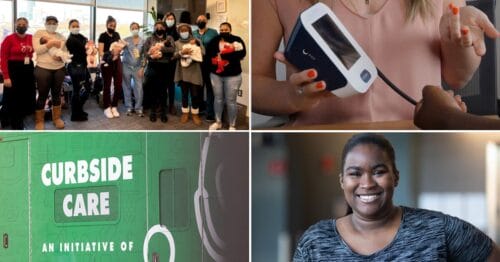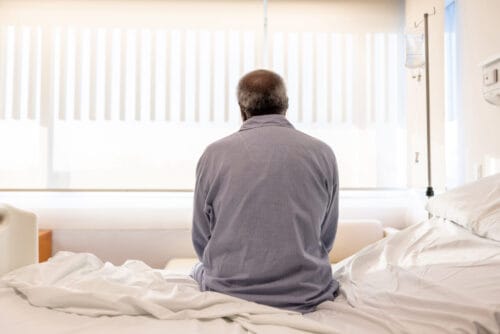COVID-19, Racism, and Health: Changing Predictable Outcomes
April 15, 2020
By Kristen Jackson, By Julia Del Muro
As data shows the coronavirus is more greatly affecting people of color, experts raise concerns for post-pandemic repercussions and call for prioritization of the social determinants.
As the United States surges with COVID-19 cases, Black communities are already besieged with disproportionate rates of illness and exacerbated consequences, including hospitalization and death. According to city data, 40% of those who are diagnosed with COVID-19 in Boston are African American or Black, yet that population only makes up 20% of the city’s population. A similar trend is being reported in other states across the country, according to preliminary findings by the Centers for Disease Control and Prevention.
COVID-19 has been exposed as the #greatUNequalizer, as it disproportionately impacts communities of color. To show that, we compiled all the available state coronavirus data by race. It reveals that Black populations are bearing an uneven burden of COVID-19 cases and deaths. pic.twitter.com/5zTihVCnkd
— Colleen Kelly, MD (@ckelly60637) April 16, 2020
While the prevalence of COVID-19 is higher among Black people, it has been widely reported that race alone does not make someone more susceptible to the virus. What does make someone more prone are pre-existing conditions like diabetes, asthma, and heart ailments — all of which disproportionately impact Black people and are more deeply rooted in a longstanding history of systemic racism and social determinants than in biological predisposition, experts argue.
While addressing the social determinants of health has long been central to the mission of healthcare institutions like those in the Healthcare Anchor Network, a lack of widespread adoption of the upstream approach to healthcare delivery has permitted cycles of inequities — and they will continue unless the healthcare sector embraces a fundamental paradigm shift.
“We knew this was going to fall out this way”
Continued disinvestment in communities of color has created a perfect storm for discrepancies in health and outcomes, says Thea James, MD, an emergency medicine physician and Boston Medical Center’s vice president of mission.
“A long time ago, people were relegated to certain communities and certain socioeconomic futures that made it impossible for them to access the things that enable people to thrive,” says James. From redlining to segregation, the United States has implemented unjust systems over time, preventing economic mobility and forcing Black people and other minorities to remain in poorly funded areas for generations. “When you have lower income, you will have worse health status. And because your children are beneficiaries of what your resources are, the same thing happens for them,” says James.

These social determinants are a powerful predictor of one’s health outcomes, especially chronic diseases such as asthma, diabetes, and cardiovascular disease, and are being intensified by the COVID-19 pandemic.
“These conditions are the risk factors that make you more likely to have complications from COVID” says Sabrina Assoumou, MD, MPH an infectious disease physician at BMC.
Adding to the Black population’s risk of developing severe symptoms are other indicators of inequity, including living in multigenerational housing and working low-wage jobs that are now considered essential services. The Black community even has reason to hesitate in wearing recommended masks or bandanas in public for fear of being perceived as criminals. These factors all interfere with the population’s capacity to practice safe social distancing and isolation, contributing to a higher likelihood of becoming ill.
“We knew this was going to fall out this way,” says Assoumou, acknowledging that demographic data consistently shows Black people among the most disadvantaged for health outcomes, regardless of the crisis.
Black distrust in healthcare could worsen
Compounding the issue of Black people being more vulnerable to COVID-19 is a longstanding mistrust for the healthcare system, due in part to the lack of diversity among providers. Data shows Black patients and other patients of color do better when their doctors are Black, explains Assoumou.
Now, experts worry that the healthcare industry’s pandemic response could deepen the mistrust. In particular, crisis standards of care — specifically, the idea of saving one person over another based on pre-existing conditions, life expectancy, and other factors in the event of an overwhelmed healthcare system and resource shortages — has raised concerns among those who care for the Black community. James summarizes an extremely complex weave of factors, a history of systemic inequities that have teed up Black people for poorer health, in one simple statement: “It’s almost like being Black is a pre-existing condition.” And if healthcare leaders aren’t extremely thoughtful in drafting their frameworks for the allocation of life-saving care if crisis standards of care need to be enacted, Black people could be at-risk.
Many hospitals are still working through the nuances of the framework that will inform agonizing decisions no physician ever wants to have to make. The algorithm may negatively weigh chronic conditions such as chronic kidney disease, which can stem from under-treated diabetes or prolonged high blood pressure and is four times more prevalent among Black individuals than white. Vonzella Bryant, MD, an emergency medicine physician, worries about the impact crisis standards could have on patients who don’t see the immense difficulty hospital leadership faces in creating an algorithm that actually aims to eliminate bias and subjectivity in crisis situations, but instead only feel the pain of the outcome.
“I have a feeling patients are going to say, ‘They let my family member die because they were Black,’ even though it wasn’t because they were Black — it was because they were part of an algorithm that said, ‘Well, other patients will probably do better than them,'” says Bryant. “But that’s going to be carried down from generation to generation.”
In acknowledgment of this potential and in conscious efforts to avoid it, the City of Boston has created the COVID-19 Health Inequities Task force, with Thea James, MD sitting among its members. The group provides guidance on addressing racial inequities throughout the pandemic. At Boston Medical Center, where equity is at the core of its mission — “exceptional care, without exception” — teams are scrutinizing the crisis standards of care even more carefully. Populations that are already disadvantaged also make up the majority of their patient demographic.
“We take this very seriously,” says James.
The potential for compounding disparities
The pandemic also brings into question what the fallout will be for the Black community once the worst of the crisis is over. Right now, healthcare resources are chiefly reserved and prioritized for response to COVID-19. The longer this goes on, the longer non-urgent healthcare needs could go unchecked and worsen, especially for the Black patient population who already have a complicated relationship with the healthcare sector. Cassandra Pierre, MD, MPH, an infectious disease physician at BMC, is thinking about the downstream consequences of this infection.
“Are people having the same access to family planning? Are we detecting new HIV diagnoses as rapidly as we did before?” says Pierre, who adds that behavioral health is being especially hard-hit right now. “We have a huge burden of unmet mental health needs in the Black community and I fear that this might compound it.”
Breaking the cycle: A way forward to improve outcomes
When the crisis starts to improve, significant measures will need to be put into place to remediate this interruption in typical healthcare access. With it, however, comes opportunity to make vast improvements and stem the cycle of disparities in Black populations, both in the immediate and long-term. Pierre shares what she and her colleagues are keeping top of mind: “How can we get to the basics so that we can prevent this from happening again, from seeing these health disparities play out again and again in every new crisis?”
In the immediate reality, Pierre calls for a paradigm shift to meet patients where they are, whether it be through telemedicine or home care, in an effort to improve trust and comfort but also access. “We need to make sure that we’re aggressively looking for them and making sure that we’re giving care where people need it most,” she says.
Out the gate, the most efficient way to build these connections, and disseminate reliable, informed messaging, may be through community leaders.
“The more that we learn to partner with people who are the leaders in the community, the more we’ll be able to empower our patients,” says Pierre. “I want to make sure that we’re getting the right messages out to people as soon as we can. People are listening to those that they feel comfortable and aligned with.”
While the goals may seem ambitious, the COVID-19 public health emergency has revealed barriers can be broken and change is possible.
When a vaccine becomes available, significant efforts must be made to make sure it reaches the Black community. “What I’m hoping is that COVID will remind us of the importance of public health,” Assoumou says. “When we roll out those new interventions, we really need to make sure that we get them to the people who may not have had access before.”
In the long-term and on a system-wide scale, the healthcare sector can also be a catalyst for change. For one, there is a need for greater representation in healthcare.
“We need to diversify the healthcare system so patients will be more trusting with our recommendations,” Bryant explains, pointing also to literature that suggests people receive better care when their care teams are more diverse.
Of course, diversifying healthcare also means working with state and federal leaders to invest in and advocate for more people of color pursuing careers in the health sciences so that we can “grow the base,” says Bryant. Additionally, the healthcare sector can call on its leadership to mandate cultural competency training across all roles to bring better understanding of and sensitivity to diverse patient populations’ needs.
While the goals may seem ambitious, the COVID-19 public health emergency has revealed barriers can be broken and change is possible.
“Although right now we’re in crisis mode, all of it is showing us that we can really work together and come up with solutions,” Assoumou says. James similarly notes that many new and innovative ideas have emerged in response to the pandemic — red lights have turned green almost overnight.
“Some of these genies should stay outside the bottle,” James concludes.


